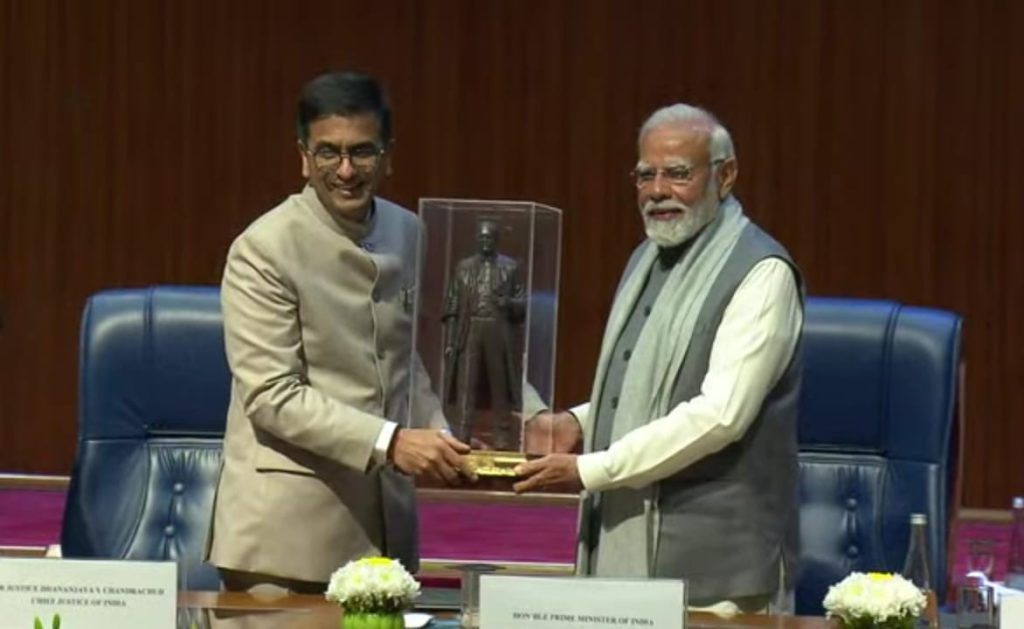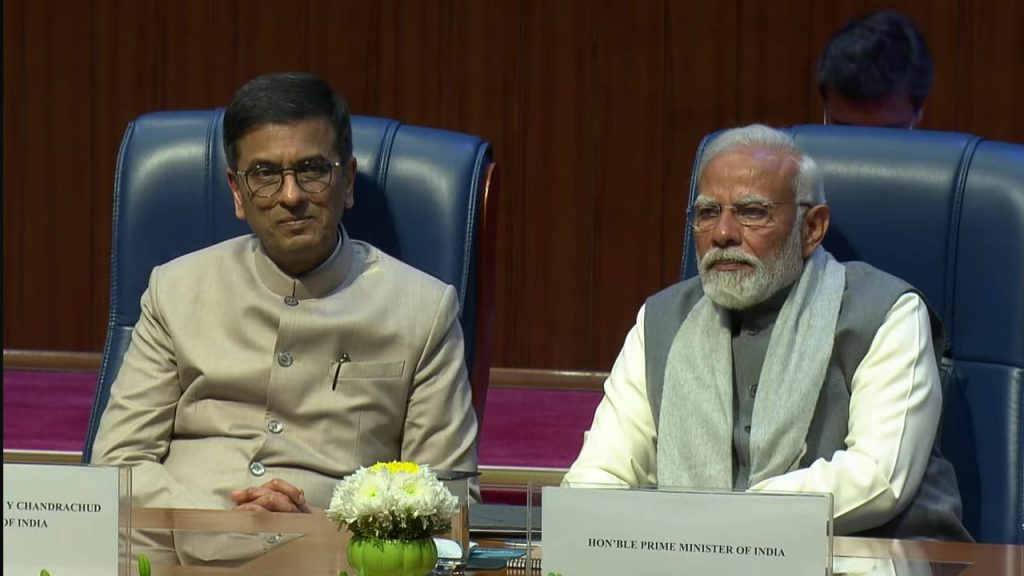Chief Justice of India DY Chandrachud on Sunday encouraged the lawyers to shift from adjournment culture to a culture of professionalism and also adopt flexi timings during the long vacations of courts.
Attending the Diamond Jubilee celebrations of the Supreme Court at the Additional Building Complex of the Apex Court, the CJI said through the Constitution, people gave to themselves this court. It was not just a legal document, but also represented the feeling of mutual respect towards fellow citizens and feeling of responsibility in the institutions which it created.
He said the judiciary must look back and look forward in equal measure. Mahatma Gandhi said recall the face of the poorest and weakest man and ask yourself if the step you contemplate is going to be of any use to him. Since the founding of this court, its decisions have been guided by this principle, noted the CJI.
He said the Front Desk experience of approaching courts has changed completely. As opposed to lawyers lugging trolley cars of papers, now the Supreme Court and other courts of the country have facility of filing cases at the click of a button.
E-filings were today available in 25 states. More than 20 lakh cases have been e-filed so far.
He said with the support of the bar and the bench, the courts of the country were able to swiftly shift to virtual hearing during the Covid-19 pandemic. Even after the pandemic, hybrid hearings continued to be a feature of all Indian courts. This has democratised access to the Supreme Court, he added.
The CJI said within the enabling perimeter of this quadrangle of transformation, the Supreme Court has uplifted the experience of everyone, who was either a part of the judicial system, or who came in contact with it.
Talking about future developments, the CJI said the Supreme Court was soon going to migrate its digital data to a cloud-based infrastructure. It was also on the verge of opening a war room equipped with technology enabling the Apex Court to monitor real-time judicial data of the entire country.
Just as the courts were made tech-savvy, it was important to realise that India was going through a period of social and demographic transformation. Women were seen in important positions across the nation. There was a greater focus on inclusion of marginalised societies, he noted.
Before 2024, only 12 women were designated as senior advocates in the history of the Supreme Court over the past 74 years. Last week, the Supreme Court designated 11 women in one selection.
He said the legitimacy of the courts will endure from inclusion of diverse sections of population in the judicial system. Therefore, there was a need to make more effort to bring different sections of the society into legal profession. For example, representation of members of scheduled castes and scheduled tribes was still inadequate.
In the near future, the judiciary must address the structural issues affecting judiciary such as pendency of cases, the archaic procedures of the courts, and the culture of adjournments.
He said it was about time to begin the conversation on long vacations and decide, in consultation with the bar, whether flexi-time for lawyers and judges.
Stating that it was important to reflect on the journey traversed so far, the CJI encouraged everyone to renew the pledge to uphold the Constitution within and beyond the court rooms.
The Supreme Court celebrated 75 years of its inception with a grand event at the Additional Building Complex of the Apex Court, which was inaugurated by Prime Minister Narendra Modi.
Mr Modi launched citizen-centric information and technology initiatives on the occasion. These include Digital Supreme Court Reports (Digi SCR), Digital Courts 2.0 and new website of the Supreme Court.


The Digital Supreme Court Reports (SCR) will make the Apex Court judgments available to the citizens of the country free of cost in electronic format. All 519 volumes of the Supreme Court reports since 1950, covering 36,308 cases, shall be available in a digital format, bookmarked, user-friendly, and with open access.
Digital Courts 2.0 application is a recent initiative under the e-Courts project to make court records available to the Judges of district courts in an electronic form. This is coupled with the use of artificial intelligence (AI) for transcribing speech to text on a real time basis.
The Prime Minister also launched the new website of the Supreme Court. The new website is in bilingual format in English and Hindi and has been redesigned with a user-friendly interface.
Chief Justice of Bangladesh Obaidul Hassan, Chief Justice of Bhutan Chogyal Dago Rigzdin, Chief Justice of Mauritius Rehana Bibi Mungly-Gulbul, Chief Justice of Nepal Bishowambhar Prasad Shreshtha and Chief Justice of Sri Lanka Jayantha Jayasuriya graced the occasion.
Supreme Court judge Justice Sanjiv Khanna, Law Minister Arjun Ram Meghwal, Attorney General R Venkataramani, President of the Supreme Court Bar Association Adish Aggarwala and Chairman of the Bar Council of India Manan Kumar Mishra, among others, were present on the occasion.
The Supreme Court of India was inaugurated in the Parliament Building on January 28, 1950. Back then, there was no separate building for the Apex Court, which functioned from the Parliament Building then.
The original Constitution of 1950 had a Chief Justice of India and seven puisne judges and had left it to Parliament to increase the number.


